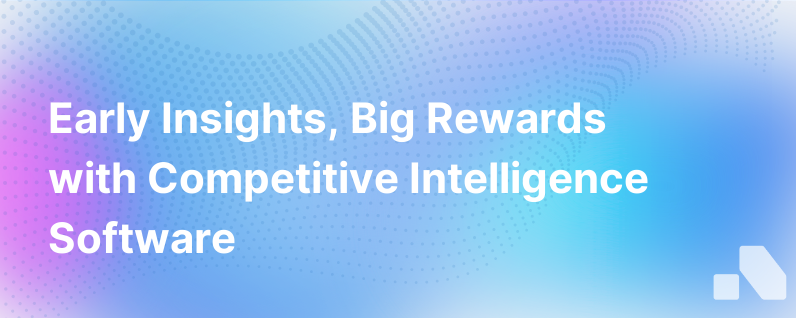
In the high-stakes realm of B2B sales, knowledge isn't just power—it is the lifeblood of sustainability and growth. The earlier a business can gain insights into the competitive landscape, the more prepared it can be to navigate market nuances, customer preferences, and the strategic maneuvers of competitors. It is in this context that we argue for an essential investment: competitive intelligence software.
Understanding Competitive Intelligence
Broadly, competitive intelligence (CI) encompasses practices and technologies enabling systematic data collection and analysis regarding competitors and the business environment. It's about developing a deep understanding of what’s happening outside of your corporate walls that could influence your company’s path forward.
For a B2B sales operation, leveraging CI software means having an armory of insights to make informed decisions—from shaping sales strategies to product development tuning and marketing messaging fine-tuning. Let's peel back the layers on how these early insights can unlock big rewards.
Early Insights: A Panoramic View
CI software allows sales teams to detect shifts in competitors’ strategies, gather early warnings about potential threats, pinpoint emerging market trends, and anticipate industry disruptions. These capabilities extend beyond traditional market research, offering a near-real-time snapshot.
-
Proactive Strategy Crafting Predictive analytics, one of the gleaming tools in CI software, isn't just about reacting but proactively crafting strategies that keep a business one step ahead.
-
Informed Sales Conversations Sales professionals equipped with competitive insights can better position their products and deliver compelling arguments tailored against competitor offerings.
-
Market-Driven Innovation Understanding how competitors are solving customer problems can drive innovation. A strong CI tool will highlight where there are product gaps and opportunities for differentiation.
Big Rewards: The Competitive Edge
Implementing CI software is akin to setting up a forward outpost in a contested terrain; the knowledge gleaned from the front lines equips a business with the strategies needed to secure a competitive edge.
-
Enhanced Decision-Making Sales teams can pivot strategies on a dime based on fresh intelligence, ensuring that their approaches resonate with evolving market expectations.
-
Increased Sales Efficiency By prioritizing accounts with the highest propensity to close based on competitive positioning, sales teams can optimize their efforts and boost conversion rates.
-
Refined Product Messaging Competitor product developments offer cues on refining product messaging to better address unique selling propositions (USPs) and key differentiators.
-
Customer Retention In a world where customer loyalty is hard-won, insights on competitors’ strategies can be used to reinforce existing relationships and reduce churn.
Making the Case for Investment
The case for investing in CI software might raise questions around budget allocation, especially in an environment where every spending is scrutinized. However, the benefits of such tools often outweigh the costs:
-
Return on Investment (ROI) Tangible benefits can be traced back in the form of increased sales productivity, more wins against competitors, and higher retention rates—all contributing to a positive ROI.
-
Cost Avoidance The costs associated with being outmaneuvered by competitors can be steep. From missed opportunities to lost market share, the financial impact of being left in the dark is a compelling reason to invest in CI.
-
Scalability As businesses grow, manually tracking competitors and market trends becomes unfeasible. CI software scales with your business, offering insights that match your growth trajectory.
Selecting the Right CI Software
While the market offers a plethora of CI tools, selecting one that aligns with a company's specific sales ecosystem is crucial. Factors to consider include integration capabilities with existing CRM tools, the granularity of insights provided, ease of use, and the agility of the software to adapt to new market conditions.
Aomni: Integrating CI Seamlessly into B2B Sales
A company like Aomni can be a frontrunner when integrating competitive intelligence into a B2B sales strategy. With its cutting-edge AI platform, Aomni simplifies complex market data into actionable sales insights. From real-time account research to competitive analyses that are not just auto-generated but insightfully curated, Aomni slims down the 15-minute morning brief to sheer seconds.
In conclusion, the early insights provided by competitive intelligence software pave the path for big rewards in B2B sales, offering clarity in an otherwise competitive fog of war. The investment into a CI tool like Aomni not only sharpens a company's competitive edge but also fosters an organizational culture of agility and awareness—essential components for success in the modern business arena.
Sources:
- Early Insights, Big Rewards: Making the Case for Competitive Intelligence Software
- The 10 Benefits Of Using Competitive Intelligence In 2023
- Competitive Intelligence: Definition, Types, and Uses
- 6 Ways to Justify the Value of Competitive Intelligence to Your Business
- 5 Benefits of Competitive Intelligence: How to Maximize Your Results
- How to Convince Your Management to Launch a Competitive Intelligence Project
- 5 things to look for in a competitive intelligence tool
- Definition of Competitive Intelligence (CI) - Gartner Information Technology Glossary